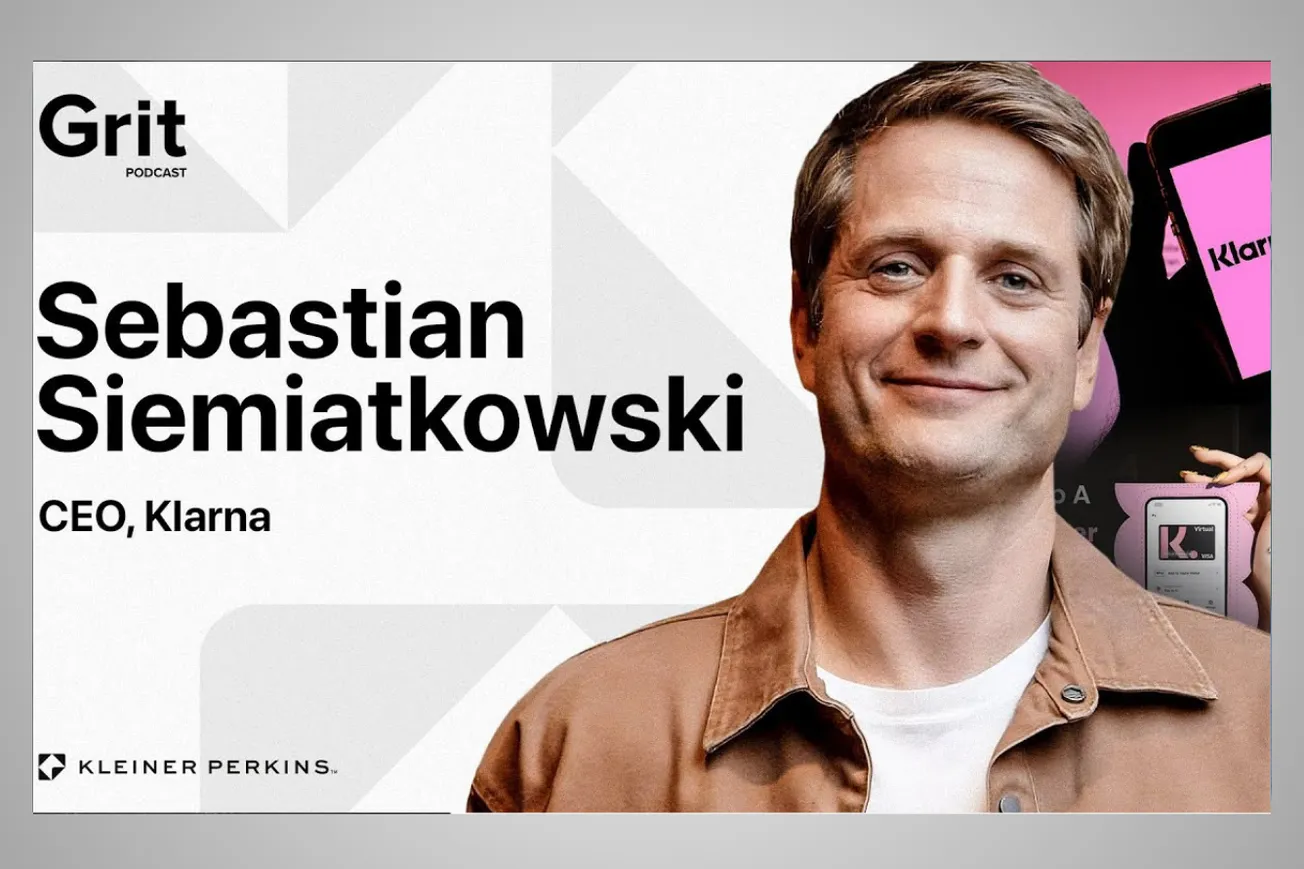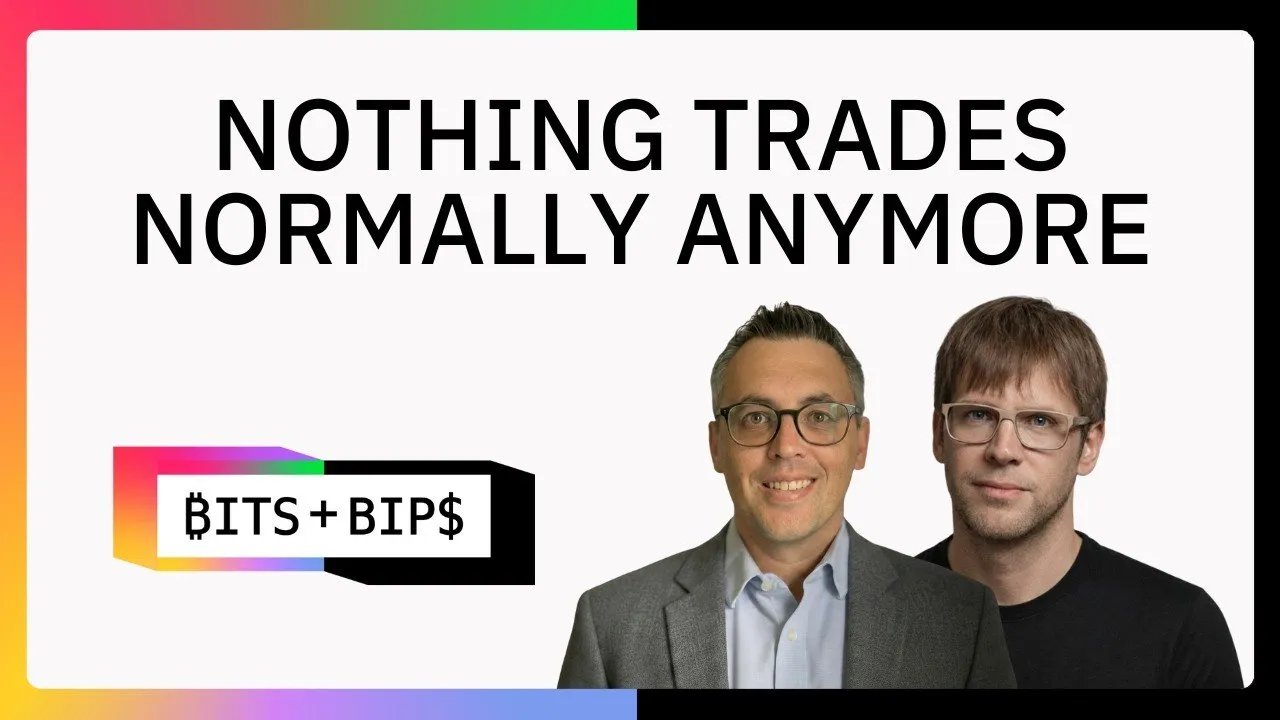Table of Contents
The CEO of Europe's most valuable fintech company explains how he convinced Sam Altman to partner with a "small country cousin from Sweden," why Klarna stopped hiring humans, and how AI eliminated 700 customer service jobs while improving satisfaction scores.
Klarna CEO Sebastian Siemiatkowski shares his journey from Stockholm entrepreneur to Silicon Valley power player, revealing how AI transformation helped the $46 billion fintech company reinvent itself while navigating European skepticism and American opportunity.
Key Takeaways
- Klarna deployed AI to handle customer service inquiries equivalent to 700 full-time employees while improving customer satisfaction scores
- Sebastian strategically positioned himself with Sam Altman by manufacturing a reason to meet, recognizing OpenAI's future importance before it became obvious
- The company has essentially stopped hiring new employees, instead focusing on AI-driven productivity improvements and automation at scale
- European companies face structural disadvantages in Silicon Valley perception, requiring extra effort to be taken seriously as potential partners
- Klarna's "Toyota Way" philosophy emphasizes continuous improvement and efficiency optimization rather than rapid scaling for its own sake
- The fintech industry operates in cycles between regulation and innovation, with current AI transformation representing a fundamental shift rather than temporary hype
- Sebastian's father's early death shaped his risk tolerance and urgency around building meaningful companies while minimizing personal financial exposure
- Common equity structures in European companies create different incentive alignments compared to typical Silicon Valley venture-backed startups
Timeline Overview
- 00:32–06:01 — Introduction and Workday Partnership: Sebastian's strategic thinking about enterprise software partnerships, the decision to move away from Salesforce, and building internal tools versus buying external solutions
- 06:01–08:45 — Rolling Your Own Solutions: The philosophy of building proprietary systems, weighing vendor dependencies against internal development costs, and maintaining competitive advantages through custom technology
- 08:45–15:33 — AI-Driven Customer Service Revolution: Klarna's deployment of AI customer service handling equivalent to 700 employees, dramatic improvement in satisfaction scores, and the speed of AI implementation
- 15:33–19:28 — Automation at Scale for Business: Broader applications of AI beyond customer service, the strategic approach to automation implementation, and productivity improvements across multiple business functions
- 19:28–23:40 — The Toyota Way Philosophy: Continuous improvement mindset, efficiency optimization focus, and the disciplined approach to scaling that prioritizes sustainable growth over rapid expansion
- 23:40–25:36 — Sam Altman Meeting Strategy: Sebastian's calculated approach to building relationships with OpenAI leadership, manufacturing reasons for face-to-face meetings, and overcoming European perception barriers
- 25:36–28:25 — Playing Offense with AI: Klarna's proactive stance on AI adoption, competitive positioning through early implementation, and the strategic decision to embrace rather than resist technological disruption
- 28:25–31:44 — Reinventing Klarna Through Technology: The comprehensive transformation of business operations, moving beyond traditional fintech models, and building technology-first organizational capabilities
- 31:44–35:37 — The Startup Journey from Stockholm: Early entrepreneurial experiences in Sweden, cultural differences in risk-taking, and building international ambitions from a small European market
- 35:37–39:28 — Common Equity and Ownership Structures: European approach to company ownership, differences from Silicon Valley venture capital models, and the implications of founder-controlled equity structures
- 39:28–42:24 — Champions League Mentality: Sebastian's competitive drive, the ambition to compete globally rather than remaining in regional markets, and the psychological aspects of international business competition
- 42:24–47:35 — Understanding Hype Cycles: Distinguishing between temporary trends and fundamental technological shifts, the maturation of AI technology, and strategic timing for major investments
- 47:35–52:28 — Sebastian's Father's Influence: The impact of early parental loss on risk tolerance, entrepreneurial urgency, and the drive to build meaningful companies while maintaining financial stability
- 52:28–57:23 — Control and Stability Philosophy: The balance between taking calculated risks and maintaining personal security, founder psychology around equity and control, and lessons from family financial hardship
- 57:23–62:27 — Comfort Zone vs Stretch Zone: Personal growth through challenging situations, the importance of staying intellectually stimulated, and finding balance between security and ambition
- 62:27–66:23 — Creating Organizational Resilience: Building anti-fragile business systems, learning from operational challenges, and developing capabilities that improve under stress rather than breaking
- 66:23–68:36 — Why Klarna Stopped Hiring: The strategic decision to pause human hiring in favor of AI productivity gains, workforce optimization through technology, and the future of employment in AI-enhanced organizations
The AI Customer Service Revolution
Sebastian Siemiatkowski transformed Klarna's customer service operations by deploying AI systems that handle inquiries equivalent to 700 full-time employees while simultaneously improving customer satisfaction scores. This wasn't gradual automation—it represented a complete reimagining of how financial services companies interact with customers.
The implementation speed surprised even Sebastian. What traditionally would have required months or years of planning and rollout happened in weeks once the technology reached sufficient maturity. The AI systems don't just answer simple questions; they handle complex financial inquiries, dispute resolutions, and account management tasks that previously required trained human specialists.
The results extend beyond cost savings to fundamental service improvements. Customer satisfaction increased because AI provides consistent, accurate responses without the variability of human representatives having good or bad days. Response times decreased dramatically, and the system operates 24/7 across all time zones without staffing constraints.
- AI systems now handle customer service volume equivalent to 700 full-time human employees
- Customer satisfaction scores improved despite reducing human interaction, demonstrating technology enhancement rather than replacement
- Implementation timeline measured in weeks rather than months due to rapid AI capability advancement
- The transformation covers complex financial services rather than simple FAQ-style interactions
This transformation illustrates how AI adoption in enterprise settings can deliver immediate operational improvements while creating competitive advantages that compound over time. Companies that hesitate on AI implementation risk falling behind competitors who embrace the technology early.
Strategic Positioning with Silicon Valley Power Players
Sebastian recognized Sam Altman's future importance before OpenAI became the dominant AI company, strategically manufacturing opportunities to build relationships despite geographic and cultural barriers. He understood that European companies face inherent skepticism in Silicon Valley partnerships and needed to overcome perception gaps through direct engagement.
The meeting with Altman required significant personal investment—flying to San Francisco with a manufactured business excuse because Sebastian knew a "small country cousin from Sweden" wouldn't naturally be on Altman's priority list. By the time he arrived, Altman's calendar had compressed from three hours to thirty minutes, illustrating the rapidly increasing demand for his attention.
This proactive relationship building reflects broader challenges European entrepreneurs face when competing for attention and partnerships with Silicon Valley's technology leaders. Geographic distance, cultural differences, and market size perceptions create barriers that require deliberate effort to overcome.
- Sebastian manufactured business reasons to meet Sam Altman before OpenAI's mainstream success became obvious
- European companies face structural disadvantages in Silicon Valley perception, requiring extra effort for partnership consideration
- Altman's calendar compression from three hours to thirty minutes demonstrated rapidly increasing demand for his time
- Strategic relationship building required significant personal investment and travel commitment
The successful partnership between Klarna and OpenAI demonstrates how European companies can compete globally when founders take proactive approaches to building Silicon Valley relationships despite initial disadvantages.
The End of Traditional Hiring
Klarna has essentially stopped hiring new employees, instead focusing on AI-driven productivity improvements that eliminate the need for additional human resources. This represents a fundamental shift in how technology companies think about scaling operations and capabilities.
Rather than adding headcount to handle increased business volume, Klarna deploys AI systems that handle customer service, automate business processes, and enhance existing employee productivity. This approach challenges traditional startup scaling models that equate growth with hiring.
The strategy extends beyond customer service to multiple business functions. AI handles routine tasks across finance, operations, and compliance, allowing existing employees to focus on higher-value activities that require human judgment and creativity.
- The company has stopped hiring new employees in favor of AI-driven productivity improvements
- AI automation handles business volume increases without corresponding headcount growth
- Multiple business functions benefit from automation beyond customer service applications
- Existing employees focus on higher-value activities requiring human judgment rather than routine task execution
This hiring freeze reflects Sebastian's conviction that AI productivity gains can substitute for human hiring while improving operational efficiency and reducing long-term costs.
Overcoming European Market Limitations
Sebastian built Klarna with global ambitions despite starting in Stockholm, recognizing that European markets alone couldn't support the scale of company he wanted to create. This required developing "Champions League mentality"—competing against the world's best companies rather than remaining satisfied with regional success.
The challenge involves overcoming cultural differences around risk-taking, venture capital availability, and market expectations. European entrepreneurs often face smaller addressable markets, more conservative investor attitudes, and regulatory complexity that can limit growth potential.
Klarna's success required building technology capabilities and business models that could compete directly with Silicon Valley companies while navigating European regulatory requirements. This dual competency—European compliance sophistication combined with Silicon Valley growth ambition—created unique competitive advantages.
- European entrepreneurs must develop global competitive mindset rather than accepting regional market limitations
- Cultural differences around risk-taking and venture capital create structural challenges for European startups
- Regulatory sophistication developed in European markets can become competitive advantage in global expansion
- Success requires building technology capabilities that match Silicon Valley standards while maintaining European operational expertise
Sebastian's approach demonstrates how European entrepreneurs can build globally competitive companies by combining regional strengths with international ambition and strategic Silicon Valley relationship building.
The Toyota Way: Continuous Improvement Philosophy
Sebastian applies "Toyota Way" principles to Klarna's operations, emphasizing continuous improvement and efficiency optimization rather than rapid scaling for growth's sake. This philosophy prioritizes sustainable development over venture capital-driven expansion models common in Silicon Valley.
The approach involves systematically identifying operational inefficiencies and implementing incremental improvements that compound over time. Rather than pursuing dramatic reorganizations or rapid hiring sprees, the company focuses on optimizing existing processes and capabilities.
This methodology proves particularly effective when combined with AI implementation. Instead of using technology to enable faster scaling, Klarna uses AI to improve efficiency within existing operational structures, creating sustainable competitive advantages.
- Continuous improvement philosophy emphasizes efficiency optimization over rapid scaling
- Systematic identification and resolution of operational inefficiencies creates compound advantages
- AI implementation focuses on improving existing processes rather than enabling dramatic expansion
- Sustainable development approach contrasts with typical venture capital-driven growth models
The Toyota Way provides a framework for building durable competitive advantages through operational excellence rather than depending solely on market timing or capital availability.
Distinguishing Hype from Fundamental Change
Sebastian distinguishes between temporary technology hype cycles and fundamental shifts that permanently alter business operations. His experience with previous technology waves helps him recognize when innovations represent lasting change versus temporary enthusiasm.
The current AI transformation feels different because the technology delivers immediate, measurable improvements rather than requiring future promises or speculative benefits. Customer service automation, for example, produces quantifiable results that demonstrate real value creation.
This discernment proves crucial for strategic decision-making around technology investment. Companies that correctly identify fundamental shifts can gain sustainable competitive advantages, while those that mistake hype for substance waste resources on temporary trends.
- Experience with previous technology cycles enables recognition of fundamental shifts versus temporary hype
- Current AI transformation delivers immediate measurable improvements rather than speculative future benefits
- Strategic technology investment requires distinguishing between lasting change and temporary enthusiasm
- Correct identification of fundamental shifts creates opportunities for sustainable competitive advantages
Sebastian's ability to recognize AI as a fundamental shift rather than temporary hype enabled Klarna's early adoption and resulting competitive advantages.
Personal Risk Management and Founder Psychology
Sebastian's approach to entrepreneurship was shaped by his father's early death and the resulting family financial instability. This experience created both urgency around building meaningful companies and caution about personal financial exposure.
The combination of ambition and risk management influences his approach to equity, control, and company building. Rather than pursuing maximum growth at any cost, he balances aggressive business strategy with personal financial stability.
This founder psychology affects strategic decisions around venture capital, equity dilution, and operational scaling. Sebastian maintains control and ownership stakes that provide both upside participation and downside protection.
- Early parental loss created urgency around building meaningful companies while maintaining financial stability
- Personal financial hardship experience influences risk management approach to entrepreneurship
- Founder psychology balances aggressive business strategy with personal security considerations
- Strategic decisions reflect both growth ambition and downside protection priorities
Understanding founder psychology helps explain strategic choices that might seem conservative from pure growth optimization perspectives but reflect balanced approaches to risk and reward.
Building Anti-Fragile Organizations
Sebastian focuses on creating organizational capabilities that improve under stress rather than simply surviving challenges. This "anti-fragile" approach builds companies that become stronger through operational difficulties and market pressures.
The strategy involves developing systems and processes that adapt to changing conditions while maintaining core functionality. Rather than building rigid structures that break under pressure, Klarna creates flexible capabilities that evolve with market demands.
AI implementation exemplifies this approach. Instead of viewing technological disruption as threat, the company embraces change as opportunity to build superior operational capabilities that competitors cannot easily replicate.
- Anti-fragile organizational design improves under stress rather than simply surviving challenges
- Flexible systems and processes adapt to changing conditions while maintaining core functionality
- AI adoption exemplifies embracing disruption as opportunity rather than viewing it as threat
- Superior operational capabilities created through challenge response become difficult for competitors to replicate
This resilience philosophy prepares companies for uncertain futures by building adaptability into fundamental organizational design rather than depending on stable operating environments.
Common Questions
Q: How did Klarna's AI customer service implementation achieve better satisfaction scores than human representatives?
A: AI provides consistent, accurate responses without human variability, operates 24/7 across all time zones, and handles complex financial inquiries with immediate resolution rather than requiring escalation or callbacks.
Q: Why did Sebastian manufacture a business excuse to meet Sam Altman?
A: European companies face structural disadvantages in Silicon Valley perception, requiring proactive relationship building to overcome geographic and cultural barriers that prevent natural partnership consideration.
Q: What does it mean that Klarna has "stopped hiring" new employees?
A: The company focuses on AI-driven productivity improvements that handle business growth without additional headcount, allowing existing employees to focus on higher-value activities requiring human judgment.
Q: How does the "Toyota Way" philosophy apply to technology company operations?
A: Continuous improvement emphasizes efficiency optimization over rapid scaling, systematically identifying operational inefficiencies and implementing incremental improvements that compound over time.
Q: What distinguishes fundamental technology shifts from temporary hype cycles?
A: Fundamental shifts deliver immediate, measurable improvements rather than speculative future benefits, while hype cycles depend on promises and projections rather than demonstrable value creation.
Conclusion
Sebastian Siemiatkowski's leadership at Klarna demonstrates how European entrepreneurs can build globally competitive companies by combining regional operational expertise with Silicon Valley relationship building and AI-first transformation strategies. His balanced approach to risk management and growth ambition reflects founder psychology shaped by personal experience while building sustainable competitive advantages through technological adoption and operational excellence.
The company's success illustrates that geographic location and cultural background need not limit global ambition when founders take proactive approaches to overcoming structural disadvantages through strategic relationship building and superior execution.





![This New Bitget Platform Changes the Game [Literally Gold]](/content/images/size/w1304/format/webp/2026/02/bitget-launches-universal-exchange-gold-usdt.jpg)